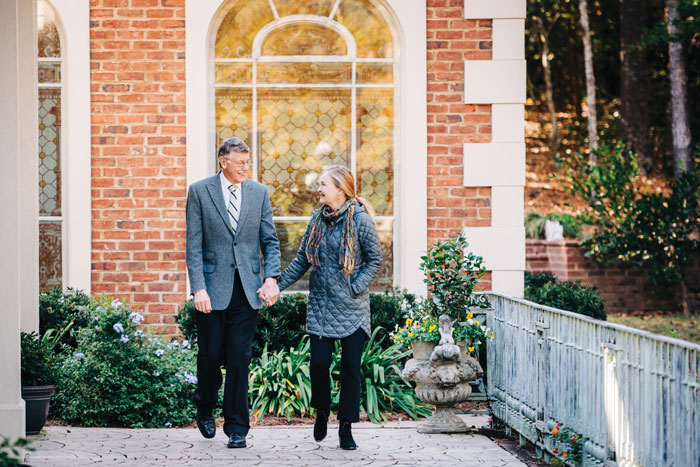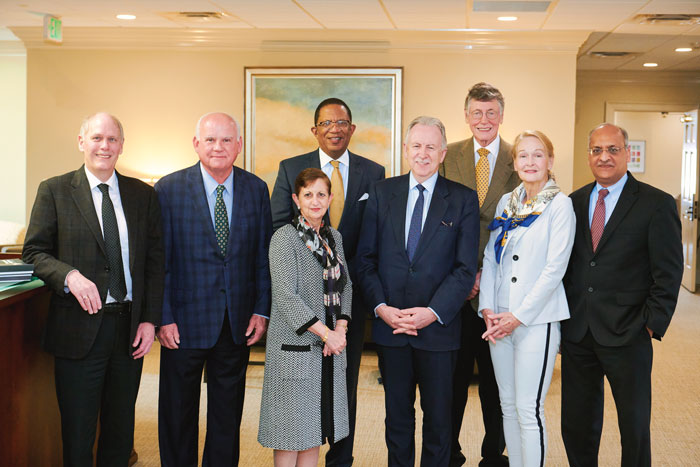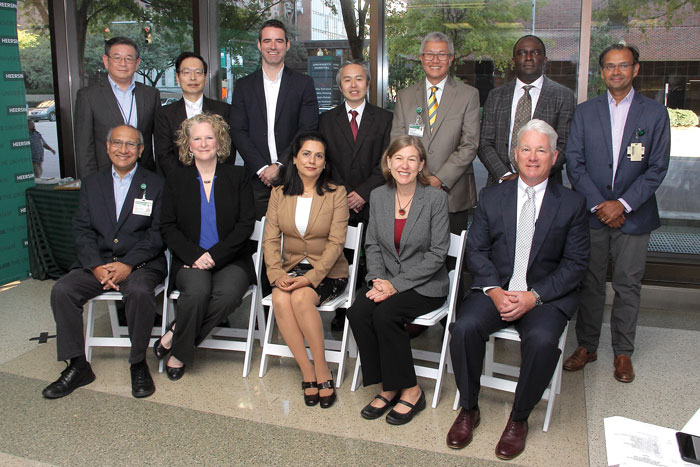 A year has passed since the September 2021 announcement of a transformational $95 million gift from longtime UAB supporter Marnix E. Heersink, M.D., which was enhanced with a contribution of $5 million from Triton Health Systems. The record gift—the single largest philanthropic commitment in university history—named the UAB Marnix E. Heersink School of Medicine and established and named the Marnix E. Heersink Institute for Biomedical Innovation and the Mary Heersink Institute for Global Health. The gift also named the planned Marnix E. Heersink Institute for Biomedical Innovation Conference Center.
A year has passed since the September 2021 announcement of a transformational $95 million gift from longtime UAB supporter Marnix E. Heersink, M.D., which was enhanced with a contribution of $5 million from Triton Health Systems. The record gift—the single largest philanthropic commitment in university history—named the UAB Marnix E. Heersink School of Medicine and established and named the Marnix E. Heersink Institute for Biomedical Innovation and the Mary Heersink Institute for Global Health. The gift also named the planned Marnix E. Heersink Institute for Biomedical Innovation Conference Center.
In making the gift, Dr. Heersink attributed his affinity for the school to a set of qualities it embodies that he calls the “three E’s”: excellence, expansive, and encompassing. Extraordinary could well be called the “fourth E,” in that the past year has been one of extraordinary excitement and activity. “Becoming a named public institution has changed the trajectory of growth for us,” says Megann Bates Cain, MPPM, assistant vice president for development for the UAB Heersink School of Medicine. “The impact is huge.”
“We’ve seen tremendous growth in the development of the Marnix E. Heersink Institute for Biomedical Innovation and the Mary Heersink Institute for Global Health, and the Heersink School of Medicine naming gift has catalyzed a host of positive outcomes for our school,” says Heersink School of Medicine Interim Dean Anupam Agarwal, M.D.
Another important outcome of the gift is the relationship it has fostered with McMaster University in Hamilton, Ontario, Canada, where Dr. Heersink also made a gift to create the Marnix E. Heersink School of Biomedical Innovation and Entrepreneurship and the Mary Heersink Program in Global Health. On March 16, UAB and Heersink School of Medicine leaders welcomed McMaster University President David Farrar and Faculty of Health Sciences Dean Dr. Paul O’Byrne, as well as Dr. and Mrs. Heersink, to the UAB campus to discuss the future of the new institutes and the abundant opportunities for collaboration.
Becoming a Biomedical Innovation Leader
The Marnix E. Heersink Institute for Biomedical Innovation was created to address the high costs, unequal access, and inefficiencies that plague the U.S. health care system by leveraging digital technologies, data, artificial intelligence, and mixed reality. The institute is led by Rubin Pillay, M.D., Ph.D., assistant dean for Global Health Innovation in the Heersink School of Medicine and chief innovation officer for UAB Health System. “We have four signature clusters for the institute: artificial intelligence in medicine, digital health care, big data and analytics, and the Metaverse or meta health,” says Pillay. “All of our programming reflects those four signature areas, which, in my opinion, will shape the future of health care.”
Top priorities for the institute in its first year include preparing for the 2023 launch of graduate certificates in Digital Health, Artificial Intelligence in Medicine, and Healthcare Innovation. A master’s degree in Healthcare Innovation is also being planned for launch in January 2024.
The first cohort of Heersink Innovation Fellows began in October. The fellows participate in the institute’s Healthcare Innovation Bootcamp, which is led by Pillay and teaches health care executives and managers how to “future-proof their health care organizations through creativity, innovation, and entrepreneurial thinking.” They then undertake a year of research, curriculum development, or outreach initiatives that link their home discipline to health care innovation. At the end of the year, the fellows gather for an annual forum to share their progress.
Similarly, a small group of graduate students will be selected each year for the Heersink Creativity, Innovation, and Entrepreneurship (CIE) Scholars Initiative. Each semester, CIE Scholars will participate in the institute’s Healthcare Innovation programming and develop a commercialization and business plan for a student or university-developed technology.
On September 29, the institute hosted the inaugural AI in Medicine Symposium, with keynote speakers Anthony Chang, M.D., chief intelligence and innovation officer at Children’s Health of Orange County and the author of “Intelligence-Based Medicine,” and Chris Aakre, M.D., vice chair for AI and Informatics at the Mayo Clinic in Rochester, Minnesota.
Closer to home, the Heersink Biomedical Innovation Institute is also partnering with city and health care leaders in Dothan, Alabama, the Heersink family’s hometown. For example, the institute partnered with Troy University to launch the Dothan Community Entrepreneurship Initiative in October 2022. This 12-month intervention program is directed at people living in poverty or disadvantaged circumstances who want to start and run their own businesses. A similar initiative was also launched in Birmingham.
“Working with social determinants of health means going to the root cause to eliminate poverty,” says Pillay. “So as an institute, tackling a root cause through the Dothan Community Entrepreneurship Initiative reflects this approach.” On March 16, 2022, UAB and Heersink School of Medicine leaders welcomed McMaster University President David Farrar and Faculty of Health Sciences Dean Dr. Paul O’Byrne, as well as Dr. Marnix and Mary Heersink.
On March 16, 2022, UAB and Heersink School of Medicine leaders welcomed McMaster University President David Farrar and Faculty of Health Sciences Dean Dr. Paul O’Byrne, as well as Dr. Marnix and Mary Heersink.
Expanding Global Health Impact
The Heersink gift allowed the school to begin organizing and coordinating existing engagements in approximately 40 countries under the umbrella of the Mary Heersink Institute for Global Health (MHIGH). Under the leadership of MHIGH Director Alan Tita, M.D., Ph.D., associate dean for Global and Women’s Health in the Heersink School of Medicine and a professor in the UAB Department of Obstetrics and Gynecology, the institute has made progress toward identifying a network of collaborative partners in international settings. This framework allows the institute to examine shared opportunities and challenges with global partners and to collaborate on finding and implementing innovative, effective, and sustainable solutions to global health problems. To better organize and coordinate global health initiatives coming out of the school, an MHIGH Steering Committee includes department-appointed representatives and faculty leading global health initiatives.
In the past year, the MHIGH, in partnership with the UAB Sparkman Center for Global Health and the School of Public Health, initiated the application for a Master of Science in Global Health program, with the aim of starting the program in fall 2023. “Our Master of Science in Global Health program will be the first of its kind at UAB, and there are a very few programs like it in the U.S.,” says Tita. “It will be an interdisciplinary program that benefits from our strong partnerships here at UAB and across the globe, and we plan to collaborate with McMaster and other universities in the affiliated Global Health Consortium.”
The MHIGH announced its first cohort of pilot project awardees in 2022. The awards are aimed at fostering collaboration between investigators at UAB and international partners and their mentees as they work to address pressing global health challenges. Projects awarded include improving maternal and neonatal outcomes in low-resource settings, developing a colorectal cancer research education program in Egypt, collaborating with the Africa Health Research Institute in South Africa to help end the tuberculosis pandemic, and a breast cancer education and stigma reduction intervention in Tanzania.
The Global Health Institute launched its Biomedical Seminar Series in February 2022 with a presentation by Robert Goldenberg, M.D., professor in the Columbia University School of Medicine Department of Obstetrics and Gynecology, on “Pregnancy Outcomes in Low-Income Countries.” In July, Benjamin Chi, M.D., MPH, professor and vice chair of research and innovation in the University of North Carolina Division of Global Women’s Health, presented “Preventing HIV in Pregnant Women and Infants: A Family-Based Approach.” On September 29, 2022, the Endowed Chairs and Professorships Reception honored 16 new endowed chairs and professors, including three new endowed positions made possible by the Heersink naming gift and two new endowed professorships funded by Triton Health Systems’ contribution
On September 29, 2022, the Endowed Chairs and Professorships Reception honored 16 new endowed chairs and professors, including three new endowed positions made possible by the Heersink naming gift and two new endowed professorships funded by Triton Health Systems’ contribution
Honoring Faculty Achievements
In 2022, the Heersink and Triton gifts enabled the establishment of several new endowed positions to honor the achievements of talented faculty physicians and scientists and help ensure stability and continuity for their research, patient care, and leadership activities. They include:
- Jeremy Day, Ph.D., an associate professor in the UAB Department of Neurobiology, was named the Michael Friedlander, Ph.D., Heersink Endowed Professor.
- Nita Limdi, Pharm.D., Ph.D., MSPH, a professor in the UAB Department of Neurology and associate director of the Hugh Kaul Precision Medicine Institute, was named the Ray L. Watts, M.D., Heersink Endowed Chair in Neurology.
- Alan Tita, M.D., Ph.D., director of the Mary Heersink Institute for Global Health, associate dean for Global and Women’s Health in the Heersink School of Medicine, and a professor in the UAB Department of Obstetrics and Gynecology, was named the inaugural Mary Heersink Endowed Chair in Global Health.
- Michael Niederweis, Ph.D., a professor in the UAB Department of Microbiology, was named the inaugural Triton Endowed Professor in Bacteriology.
- Andrea Cherrington, M.D., a professor in the UAB Division of Preventive Medicine, was named the inaugural Triton Endowed Professor in Heath Equity Research.